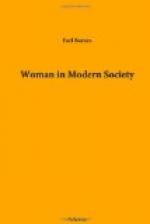Theorists have always insisted that equal suffrage would greatly improve the material conditions which surround the polls on election day. One of the prominent political leaders in Idaho, who has been intimately in touch with conditions for a quarter of a century, said that of course there had been great improvement in the last fifteen years. “Things would have improved any way,” he said, “but I am sure that the women have had a large influence. No woman has ever been insulted at the polls in Idaho and she runs no more danger of annoyance than she would in buying her ticket at a railway window. Men are not always sober in either place; but if a man made a remark to a woman that was not polite, or used annoying language in her presence, he would be mobbed by the men even in the roughest mining camp in the State.” Doubtless women have helped to break the connection between the saloon and the polling-place, but no one claims that women have made voting into a drawing-room ceremony. On the contrary, women are very persistent workers at the polls, seeking to direct doubtful voters.
Advocates of equal suffrage have pretty generally held the belief that if women were given the ballot their superior moral standards would lead to a marked change in the handling of such problems as the liquor traffic and the control of red light districts. Of woman’s superior moral standards there can be no doubt; of the actual effect of her vote upon these questions there is a great deal of doubt. While I was in Idaho, the question of local option came up before the voters of Salt Lake City, in the neighboring equal suffrage State of Utah, and the “wets” won by a vote of 14,775 to 9,162. Thousands of women must have voted for license to bring about this result. In April, 1911, the question of license or no license was voted on in Boise. In this case again the “wets” won by a considerable majority.
Take another case. For several years in Boise, until 1909, the red light district was segregated in two alleys in the heart of the city. In the municipal election of that year this issue came fairly before the voters, and the democratic nominee for mayor, who was pledged to break up the system, was elected by a considerable majority, though the city is strongly republican. This result was undoubtedly due to the women’s vote. After two years, the issue came up again; and the republican nominee, who was opposed to the scattering policy though not pledged to segregation, was elected; and this result must again have been due to the woman’s vote. Prominent women of the city told me that during the two years when the scattering policy prevailed, the evil was very conspicuous, and women going about alone felt far less comfortable than under the older system.




